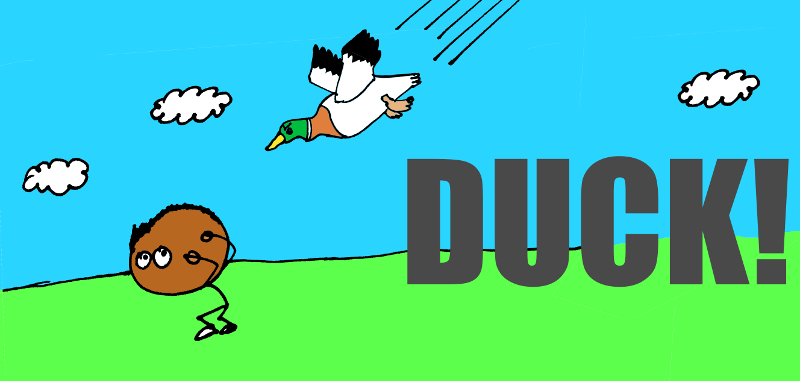Let’s start with an amusing image.
Why is this funny?
Well, even if you don’t get the joke, it’s still pretty funny, I guess.
I mean – who can’t laugh at a duck flying madly through the air?
But there’s also a language-based joke going on here.
“Duck” is a homonym – a word that looks or sounds the same as another word.
It can refer to the birds that swim around in your local park pond.
Or it means “get down because something is flying in your direction and you don’t want to get hit by it.”
Homonyms are a great source of humour in English.
They’re also a fun way to remember new words.
When I was learning Turkish, I used homonyms to make ridiculous sentences that just consisted of the same word over and over again.
“Open a hungry tree” translates to “arch arch arch.”
“Because of a hundred skinned swimming faces” translates to “yuz yuzulmush yuzun yuzunden.”
Comedy really is a great way to help you learn.
But before we look at that, let’s get some terminology under our belt.
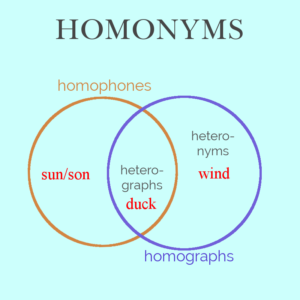
So a homonym is a word that sounds the same or is spelled the same as another word.
Words that sound the same, like “sun / son,” are called homophones – a type of homonym.
Words the are spelled the same, whether they sound the same like “duck” or don’t sound the same, like “wind,” are called homographs – another type of homonym.
Words that both sound the same and are spelled the same (like “duck”) are called heterographs.
Words that are spelled the same but don’t sound the same (like “wind”) are called heteronyms. You might recognise that word from a previous post.
Today, we’re going to look at the world of heterographs (and learn some great jokes on the way).
Well … maybe not great. But jokes nonetheless!
1) Bright
When your teachers told you that you were a bright student, did you imagine something like this?
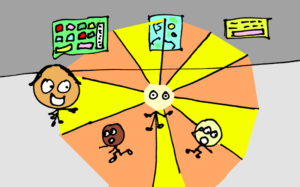 I did.
I did.
That’s because “bright” means “smart,” but can also mean “full of intense light that could maybe even melt your face (though probably not that much).”
2) Arm
So we know what one of these is, at least.
Yep – the long thing attached to your hand. It’s very useful.
But “arm” is also a verb meaning “give someone weapons.”
It’s where we get the word “army” from.
If you look at the American constitution, you’ll find the infamous 2nd amendment: “the right of the people to keep and bear Arms, shall not be infringed.”
You know – it’s the one that people who like guns like to talk about because it tells them that they can have guns.
It doesn’t refer to people collecting the long thing attached to people’s hands.
Or bears.
That’s another heterograph for another day.
3) Bark
There’s an expression in English that goes, “You’re barking up the wrong tree, mate.”
You say it to people when you think they’ve got the wrong idea of something.
But if you really think about it, it’s rather a neat phrase as it contains a heteronym.
“Bark” is the sound a dog makes (or the action of making it).
But it can also be what I like to call, “the tree’s skin.” You know – that brown stuff that protects the inside of the tree.
So there’s almost a double meaning in the phrase “barking up the wrong tree” – which is nice – as the phrase is all about getting the wrong idea in the first place.
4) Bat
Playing baseball today?
Don’t forget to bring your bat.
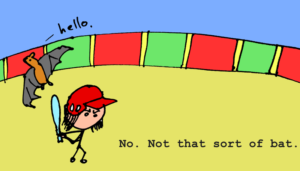
No. Not that sort of bat.
5) Lie
Here’s a trick. It’s a devious trick, but it’s a trick.
If you’re not telling someone the truth and they ask you the question, “Are you lying?”, you could say, “No.”
Why?
Because … you’re not … lying down … in bed, right?
Come to think of it, this is a terrible trick.
Just tell the truth!
6) Match
I really wanted to include this, just so I could draw this:
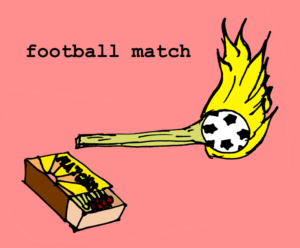
A match is the fire stick thing you use to light your gas oven.
It’s also the word for a sports game.
But now you’re going to remember the word for the fire stick thing more easily, right?
7) Right
It kind of surprises me how such common words such as “right” (and “left”), which require a lot of clarity when you’re asking someone where the station is, can actually have so many other meanings.
You can talk about human rights or women’s rights or workers’ rights – the things they simply deserve to have without question.
You can use “right” to describe a political direction.
And you can simply just say “Right!” as a way of expressing your readiness to deal with whatever you have to deal with.
In fact, there’s a whole comedy film based on the confusion between “Right!” as an exclamation and “right” as a direction.
It’s a funny film – I recommend it!
8) Left
Ok – slightly less confusing than “right.”
Maybe the station is on the left of the cake shop.
Or … “left” could just mean “remaining.”
As in “Oh no! What are we going to do? There are no more cakes left and the cake shop on the left of the station is closed!”
9) Well
Another word with more than two meanings.
A “well” is a big hole that contains drinking water at the bottom, often to give a small community or a village drinking water.
Sometimes it has a rope and a bucket.
And sometimes, in stories, people fall down them and get stuck there.
But it can also mean “good,” as in “He’s not very well.”
It can also be an exclamation … as in “Well … I’m not sure about this.”
So that’s why I drew this awful comic:
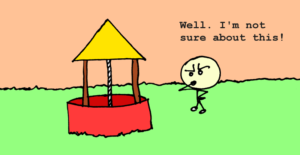
10) Ring
Another opportunity for confusion!
“He gave me a ring on Valentine’s day!”
“Wow! Does that mean you’re going to get married?”
“No – We’re on lockdown. He gave me a ring like – he phoned me, Carol! He phoned me!”
“Ah – I thought he … you know … gave you a ring. Like an engagement ring.”
“Oh – no! Why would he do that? He’s just my gardener. He wanted to know if he could do the roses next Tuesday.”
11) Date
A date can be used to describe the day of the month. The date I’m writing right now is the 25th May.
It’s also a fruit found in the Middle East. It grows on palm trees. It’s pretty sweet.
This one, too, can cause romantically-themed misunderstandings:
“Hey! Would you like a date?”
“Oh yes! I knew you were interested in me! I’d love to!”
“Er … OK … here you are.”
12) Fly
One of my favourite stand-up comedians makes a joke out of the many uses of “fly” (or “flies” in this case.)
In the middle of his stand-up routine, there would be an awkward silence.
After a few seconds, he’d pick up this picture sign …
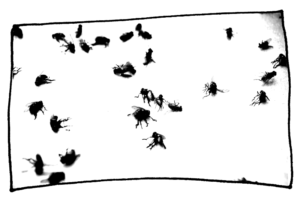
… hold it right in front of the face of some, poor person in the front row, and shout:
“FLIEEEEESSSSSS!!!!!”
A few minutes later and another awkward silence.
Then he’d do the same thing to the same poor guy in the front row.
This time the picture would look like this:
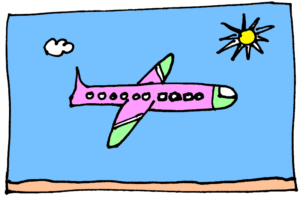
FLIEEEESSSS!!!
10 minutes later and the same victim …
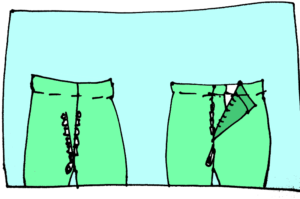
FLIIIEEESSSS!!!
The zip on your trousers is also called a “fly.”
13) Park
Looking for a new house or flat can be hard work.
Sometimes it doesn’t help when the estate agent or the landlord tend to describe the place inaccurately – you know – make it sound nicer than it is.
I once saw a place described as “overlooking a large park.”
It turned out to be a car park.
Why is it called a car park.
Well, it’s not a park for cars. It’s more closely related to the verb, “park.” Meaning to pull the car into somewhere safe (like the side of the road or a parking spot) and turn it off.
Either way – not exactly what you want to see when you open your curtains in the morning.
14) Saw
Sure – we know that “saw” is the past tense of “see.”
But it’s also the word for this thing:
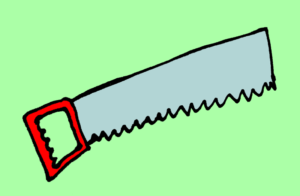
So – if you like (and if it’s true), you could say “I saw a saw yesterday.”
And that fact makes me happy.
15) Duck
We’ve covered this.
So let’s just look at the pic again:
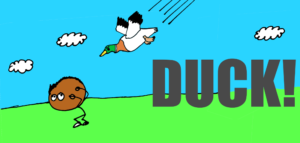
Did you enjoy reading this post?
If so, you might also like the following articles.
- 10 Contronyms
- 11 Retronyms
- 12 Meronyms
- 12 Heteronyms
- 13 Eponyms
- 16 Capitonyms
- 36 Acronyms
- Exonyms & Endonyms
Gabriel Clark, LOS Consultant & Clark and Miller Co-founder
